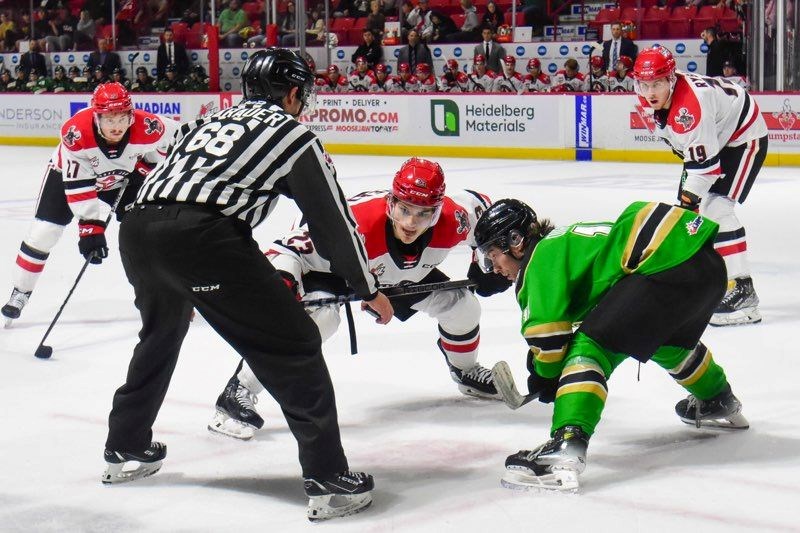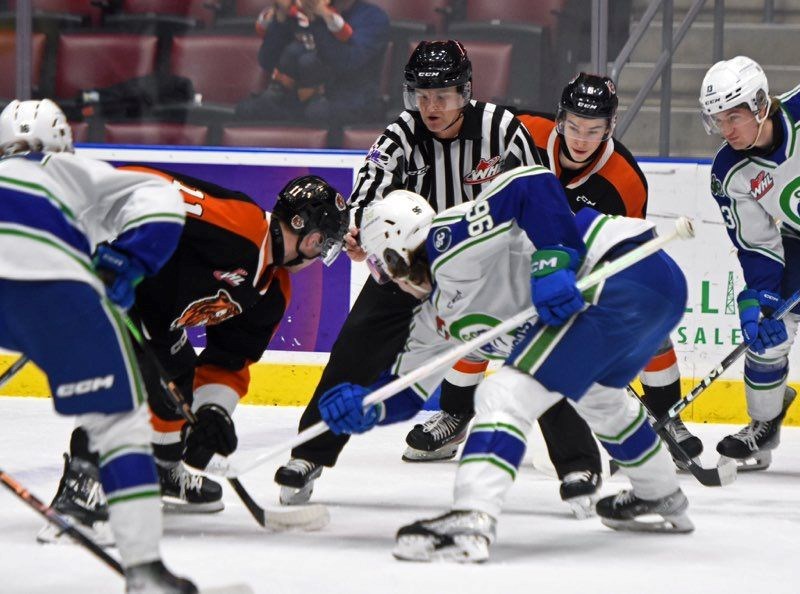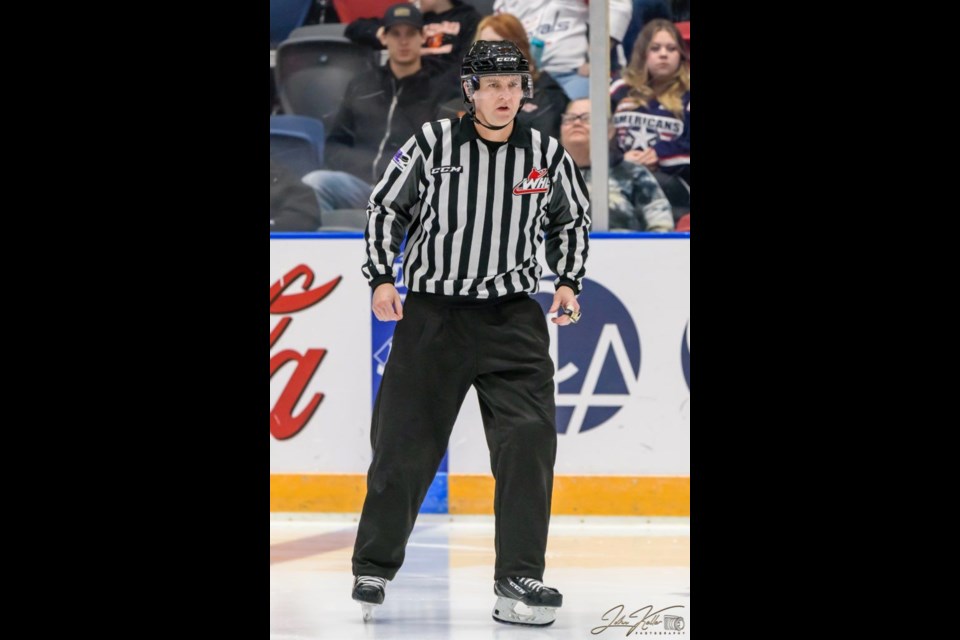OUTLOOK - Longtime dedicated hockey official Greg Sarauer is looking back on more than two decades with Canada's beloved game.
The 45-year old Outlook native, who attended school at OHS, was recognized back in early February with a milestone award by the Western Hockey League (WHL) just before a game between the Medicine Hat Tigers and the Regina Pats, recognizing 400 games that Sarauer worked as an official and a period of 24 years served with the league.
Greg, who moved to Medicine Hat when he was 20, remembers his early years in Outlook with lots of friends and lots of time to go to the rink to hit the ice. He played for as long as he could in both minor and senior hockey, but it was a chance occurrence at the rink where someone was in need of a person to fill a role that ultimately led Sarauer to what would be his true calling in the sport.

"At 12 or 13 years old, I hung out at the rink quite a bit, just like my brother and just like all my friends," said Greg, speaking with SaskToday & The Outlook over the phone. "Somebody pushed me into a youth hockey game that just happened to need a referee. They threw me a ref sweater and a whistle and said, 'Get out there!' I liked it because at that point, I was making money at a young age, and before I knew it, my dad sent me to a referee clinic in town, and I just enjoyed staying with the game at a young age in between hockey games."
Although serving as a referee meant that he'd be swapping his stick and jersey for a whistle and zebra stripes, Greg says that he enjoyed what the role offered him over the years as it still provided that vital connection to the sport of hockey.
"Just staying a part of the game," he said. "A lot of the game is still there, and I knew that playing wasn't going to take me very far, so I just wanted to stay with the game at the highest level that I could. When it's a game you love, you want to stay a part of it at some degree. I couldn't keep playing, and so I wanted to officiate."
The challenges that can come with such a role on the ice, where coaches, players and spectators look to you for decisions during the game, are what tests all officials in the work that they do on the ice. The intensity of the sport means that you need to condition yourself to be as effective as possible in many areas of communication.
"Well, hockey's such an intense sport, and it's difficult to keep both teams happy and both coaches happy; it's just the challenges of managing a game properly," said Greg. "There's a feel for the game that you need to have, and there's a lot of little pieces that go into becoming a good official. Knowledge, conditioning, and being a good communicator, which can be challenges as you're starting to develop. Putting all those tools together as you're developing is important in order to move up the ladder and progress the way that you want to."
Sarauer says that being recognized by the WHL for reffing 400 games and serving 24 years was a very nice gesture on their part, as it told him that the years he'd served were worth it. The fact that the award came at around the same time that Greg was wrapping up his on-ice career was a nice bow on top.
"It's definitely flattering to be recognized, and I didn't see that coming 24 years ago when I started," he said. "It's nice to be appreciated, that's for sure. Longevity is acceptance, and it's an award that I've earned. It's nice to get there and to just have a handshake at center ice during a game. But it was definitely unexpected. It also coincidentally came together during my final season, and it came together nicely during the end of the run."
Sarauer might be saying goodbye to the ice, but not to the sport itself. Transitioning into another WHL role, his new duties will allow him to stay involved in the sport that he loves, while still contributing around his community of Medicine Hat with the odd game here and there.
"As far as on the ice goes, I'm finished," he explained. "But I'll still be active with the game at a reduced role, as the league has asked me to continue on as a video goal judge. I'll be confirming goals and high sticks and things like that. You're not making as much money, but I still like being at the rink, so within the Western Hockey League, that's where I'll be and what I'll be doing. As for other hockey, I'll still be registering and still be doing on-ice for the odd Junior B game and the odd senior game, and I'll still be supervising youth hockey. So I'm not completely finished with officiating in hockey."
Getting involved with the sport of hockey in really any capacity, be it player, coach or official, requires someone to have a sizable level of commitment, as well as, at the end of the day, a love for the game.
"It's such a difficult job, so the love for the game needs to be there, and you have to WANT to be there," said Greg. "It takes commitment and dedication, and you just have to be mentally prepared for situations that are difficult. Hockey's such an intense game where you're going to meet a lot of disrespect from people, and you need to be able to effectively communicate and treat the challenges with a proper mindset in order to succeed."
Sarauer says he's enjoyed meeting new people and making lifelong friends in all the years that he's given the sport. Greg is happy to have worked alongside players and fellow officials and watched them develop and grow to the point where they're now in the NHL, and while he believes that it's important to take pride in all of your accomplishments, he also says that the relationships you make along the way can be what ends up being the most enjoyable.
"It's not about the games, I guess, but what I like the most is the people that I've met and worked with along the way that have really made it worthwhile," he said. "Lots of friendships and memories, and it's been such a big part of my life. I've seen several players at this level that have gone on to have NHL careers, as well as other officials that have moved on to the NHL. I take pride in that because longevity is acceptance, so it's important to take pride in that accomplishment. But it's the people who made it all worthwhile for me, and looking back, I'm sure that that's what I'll remember the most."

Greg's not the only member of his immediate family to have established an impressive career on the ice, as his younger brother Andrew was a longtime left winger who racked up plenty of ice time and points in his career while playing for the European ICE Hockey League, as well as the East Coast Hockey League and the American Hockey League. Wrapping up his own career on the ice, it was announced last summer that the WHL's Wenatchee Wild out of Washington state had hired Andrew as the team’s new assistant coach.
Greg is proud to have seen his brother accomplish so much in the sport, and he's glad to now have more chances to catch up with him and compare notes on their respective leagues.
"I'm pretty proud of him, for sure," he said. "Growing up, I remember reffing the games that he was playing in, and it's pretty incredible to see the steps that he's taken to get where he is. Unfortunately, we've never really crossed paths because he was either down in the States or over in Europe, so we never got to be on the ice together, but it was great following his career. We compared notes quite a bit over the years, so we ask questions about his league and then my league, things like that. It's good to have him back, as he's retired and back in Saskatoon now."
Greg says that he likely wouldn't be where he is today if it wasn't for the guidance of two Outlook names that helped him get a feel for his role as a referee.
"Working up the ladder, Kim Sobkowicz and Brad Harris were the two guys who really helped me with my progression," he said. "They encouraged me to stay with it and work hard at it to get me the exposure that I needed to move up to different levels where I'm applying to go to referee camps. They helped give me the tools in order to make it to that next level."
Having started out as a referee at such a young age, the position allowed Sarauer to develop a new perspective on hockey and it eventually led to him having to decide where his future was going to be in the sport.
"When I was 20 years old, I needed to make a decision in Outlook," he said. "We didn't have all the top levels of hockey in town, and so I always thought I'd move to Saskatoon, but I chose Medicine Hat because there were less officials there and they had the same levels of hockey, so it was a good decision in order to get into the WHL when I was 21 years old. That was really helpful because I got into the league before I was expecting to, and looking at 24 years now, I look back on it as a great decision!"




